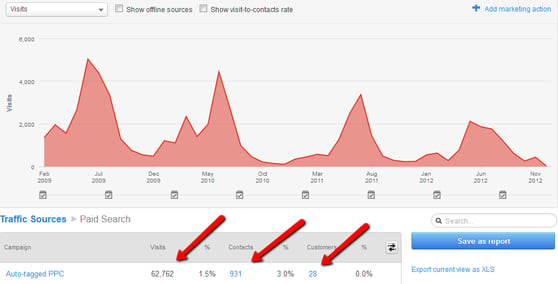Topics:
Paid MediaSubscribe now and get the latest podcast releases delivered straight to your inbox.
How to Know if Pay-Per-Click (PPC) Marketing is Worth it in 2019

Jun 17, 2016

I find it amusing that many in the inbound and content marketing space look down upon pay per click advertising almost as if it’s a black sheep in a world full of perfect marketing practices, never to be “fooled with” by such skillful (and altruistic) professionals.
Let me be blunt for a second:
If anyone ever gives you a blanket statement such as, “All PPC advertising is a waste” then they are a fool and you should ignore everything else they tell you from that point forward.
Here is the reality:
PPC is great for some companies.
PPC stinks for other companies.
Catch my drift?
Yes, just like any other marketing “practice,” the results may vary—especially with factors like industry, product, price point, competition, and ad efficacy all coming into play.
This being said, if you’re debating as to whether or not your company should be using PPC, I’d ask you to consider this simple truth:
If PPC is making your company money, then it’s worth it.
Really, that’s the key, and truth be told, it’s a key many folks lose touch with.
Over the past few years, I’ve had hundreds of people ask me why my swimming pool company uses PPC (Google Adwords) despite the fact that our inbound traffic is prolific and we get so many visitors each day. My answer to this question, as mentioned above, is always very frank:
“It makes us money.”
In fact, I’ll tell you exactly how much money PPC made River Pools from 2009-2012. If you look at the photo below, you’ll see some very important metrics—metrics that are only possible because we use advanced analytics (in this case, what you’re looking at is HubSpot’s software).
 River Pools PPC spending since starting with inbound marketing in 2009. If you can't see the photo well, just click to enlarge.
River Pools PPC spending since starting with inbound marketing in 2009. If you can't see the photo well, just click to enlarge.
From 2009-2012, River Pools received about 62,000 visitors from PPC. With the average click amount (max bid) being $1, the amount spent for the PPC in total was about $62,000. This may sound like a lot of money to some, but the key metric to understand is the fact that these 62,000 visitors lead to at least (from what we’re able to track) 28 pools sales, which equates to about 1.4 million dollars in revenue, or roughly $400k in net profit—which is a HUGE return on an advertising spend of 62k.
In other words, PPC advertising is EXTREMELY profitable for River Pools. Granted, it’s not enough to keep the business afloat by itself, but it certainly supplements (this is the goal) our other efforts to complete what is a very profitable inbound marketing campaign.
The ROI of PPC Advertising
This fact brings me to another critical point—ROI.
Just like other types of marketing, ROI (return on investment) is a HUGE deal, and no company should dismiss the value of PPC advertising until they’ve taken the time to measure out the results and at least give it a try. Nor should a company feel guilty that they have to use PPC in the first place, which, as I mentioned earlier, is a surprising and odd trend. Whether you’re a B2B, B2C, service, or product—if PPC works it works, and that’s the only thing that truly matters.
There are many other components to PPC advertising success that I could talk about today, but I’m not. My goal here was a simple one—I want my fellow inbound and content marketers to embrace all advertising mediums that lead to profitability. PPC is just one of many that fall in this bucket, but it surely should never be ignored, especially with its incredible marketing potential.
Your Turn
I’d love to hear from readers that have had success or failures using PPC advertising online. What’s your industry? What were the results? What did you learn? And if you have any general questions about PPC, don’t hesitate to ask.
So jump in folks, your comments could truly help other readers in the process of trying to make this decision for their company.


Order Your Copy of Marcus Sheridan's New Book — Endless Customers!